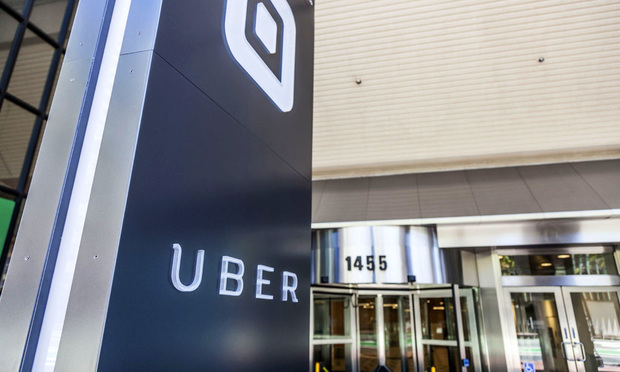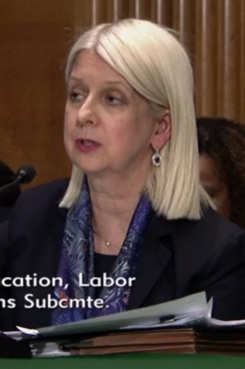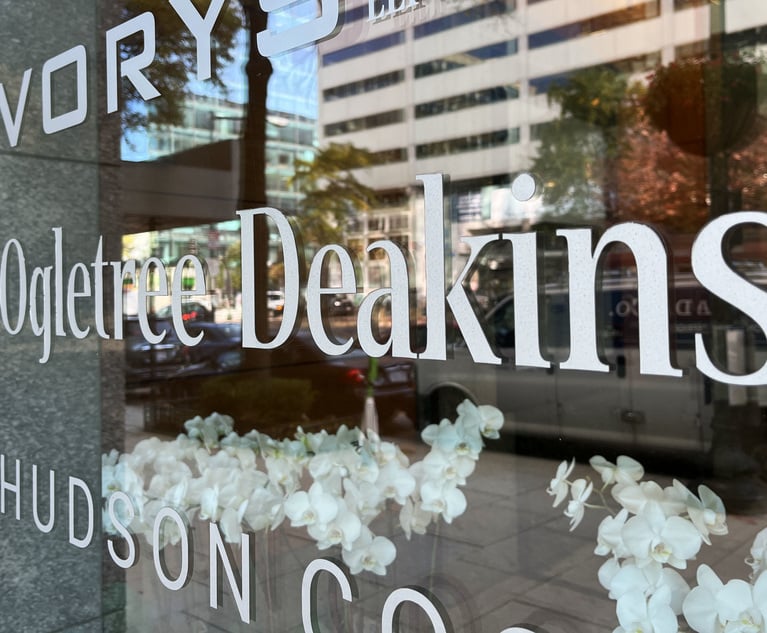US Chamber Pushes Benefits for Gig Workers, but Don't Call Them Employees
“The current legal and regulatory scheme effectively discourages companies who utilize independent workers from offering retirement benefits,” Seyfarth Shaw's Camille Olson, on behalf of the U.S. Chamber, told a U.S. Senate subcommittee on Tuesday.
February 06, 2018 at 06:55 PM
5 minute read
 Uber headquarters, located in San Francisco, CA. Credit: Jason Doiy / ALM
Uber headquarters, located in San Francisco, CA. Credit: Jason Doiy / ALM
The current labor framework inhibits gig economy companies from offering employee benefits and other protections, including retirement savings programs, without “jeopardizing the legal status” of their business models, a Seyfarth Shaw partner told a congressional panel Tuesday on behalf of the U.S. Chamber Commerce.
Camille Olson, co-chair of the firm's national litigation team, said the U.S. Chamber wants to “enhance the flexibility, portability and certainty of the retirement system to allow independents to obtain retirement security.”
Olson made clear, however, that any movement to ensure these gig workers have access to benefits should not force innovative companies to classify independent contractors as employees.
 Seyfarth Shaw's Camille Olson. Credit: Senate HELP Committee
Seyfarth Shaw's Camille Olson. Credit: Senate HELP Committee“Developing policies that promote a positive business environment, encourage innovation, and protect workers' financial futures while also preserving flexibility is an important and challenging balance for this subcommittee to strike,” she told members of a Senate Health, Education, Labor and Pensions subcommittee. She continued: “The current legal and regulatory scheme effectively discourages companies who utilize independent workers from offering retirement benefits.”
Many of the large gig economy companies such as Uber, Lyft and GrubHub build their business by classifying their workers as independent contractors. These workers generally are not entitled to the benefits such as workers' compensation, health care and retirement. The companies argue their workers benefit from the flexibility of not having to report to a boss.
The subcommittee heard from experts who stressed the importance of providing retirement benefits to not just gig economy workers, but the rising number of contract workers in the United States.
“The hype off the gig economy gives a new face to the damaging trend of eroding benefits,” said Sen. Patty Murray, D-Washington, the ranking Democrat on the Senate HELP committee. “There is new technology and new lingo but the challenges are not new.”
Confronting the gig business model, although still a small fraction of the overall economy, is ever more a focus for state and federal lawmakers, unions and the workers themselves. Workers rights group contend the arguments by companies to avoid classifying workers as employees is an old tactic to avoid paying benefits. Last year, GrubHub went to trial over the classification of its workers. There have been several major settlements with companies including Uber and Lyft over this open question.
On Monday, a federal appeals panel took up labor issues in the gig economy—reviewing a Seattle ordinance that would allow ride-hailing drivers to unionize. The U.S. Chamber sued the city over the ordinance, arguing it violated federal labor and antitrust laws.
The city acknowledged that its ordinance would be a test for the gig economy. A win for Seattle could push other local governments to follow suit in creating ways for the gig workers to take advantage of traditional benefits. Jones Day's Michael Carvin argued for the U.S. Chamber at Monday's hearing in the U.S. Court of Appeals for the Ninth Circuit.
On Capitol Hill in Washington, Olson offered several solutions to the portable retirement benefit system, including increasing the availability and access to retirement and financial education regarding existing vehicles.
Olson also said gig economy companies should be allowed to provide benefit information to independent contractors, assist with the administration and facilitation of direct deposit of funds into retirement vehicles and to contribute to portable retiree benefits for the benefit of independents.
Olson said contractors should be given monetary incentives to save for retirement and it should be ensured that companies can facilitate these measures without affecting the workers' status as an independent contractor.
Monique Morrissey, an economist at the Economic Policy Institute, said the structure of the labor system disproportionately creates barriers for low-income workers. She disagreed with the other panelists that standards should be loosened for who classifies as a worker and that tax incentives should be altered. She urged lawmakers to consider history—that worker classification is not a new issue—“before expanding these things under the guise of modernizing.”
“They should already be employees. I don't have any sympathy for companies who want it both ways,” Morrissey said. “This has always been an issue of who is a worker and who is not. We don't want to go down that road. There is no reason to reclassify.”
This content has been archived. It is available through our partners, LexisNexis® and Bloomberg Law.
To view this content, please continue to their sites.
Not a Lexis Subscriber?
Subscribe Now
Not a Bloomberg Law Subscriber?
Subscribe Now
NOT FOR REPRINT
© 2025 ALM Global, LLC, All Rights Reserved. Request academic re-use from www.copyright.com. All other uses, submit a request to [email protected]. For more information visit Asset & Logo Licensing.
You Might Like
View All
3rd Circuit Strikes Down NLRB’s Monetary Remedies for Fired Starbucks Workers

‘A Force of Nature’: Littler Mendelson Shareholder Michael Lotito Dies At 76
3 minute read
Employers Scramble to Get Immigration Records in Order Ahead of Trump Crackdown
6 minute read
Trending Stories
- 1Many LA County Law Firms Remain Open, Mobilize to Support Affected Employees Amid Historic Firestorm
- 2Stevens & Lee Names New Delaware Shareholder
- 3U.S. Supreme Court Denies Trump Effort to Halt Sentencing
- 4From CLO to President: Kevin Boon Takes the Helm at Mysten Labs
- 5How Law Schools Fared on California's July 2024 Bar Exam
Who Got The Work
Michael G. Bongiorno, Andrew Scott Dulberg and Elizabeth E. Driscoll from Wilmer Cutler Pickering Hale and Dorr have stepped in to represent Symbotic Inc., an A.I.-enabled technology platform that focuses on increasing supply chain efficiency, and other defendants in a pending shareholder derivative lawsuit. The case, filed Oct. 2 in Massachusetts District Court by the Brown Law Firm on behalf of Stephen Austen, accuses certain officers and directors of misleading investors in regard to Symbotic's potential for margin growth by failing to disclose that the company was not equipped to timely deploy its systems or manage expenses through project delays. The case, assigned to U.S. District Judge Nathaniel M. Gorton, is 1:24-cv-12522, Austen v. Cohen et al.
Who Got The Work
Edmund Polubinski and Marie Killmond of Davis Polk & Wardwell have entered appearances for data platform software development company MongoDB and other defendants in a pending shareholder derivative lawsuit. The action, filed Oct. 7 in New York Southern District Court by the Brown Law Firm, accuses the company's directors and/or officers of falsely expressing confidence in the company’s restructuring of its sales incentive plan and downplaying the severity of decreases in its upfront commitments. The case is 1:24-cv-07594, Roy v. Ittycheria et al.
Who Got The Work
Amy O. Bruchs and Kurt F. Ellison of Michael Best & Friedrich have entered appearances for Epic Systems Corp. in a pending employment discrimination lawsuit. The suit was filed Sept. 7 in Wisconsin Western District Court by Levine Eisberner LLC and Siri & Glimstad on behalf of a project manager who claims that he was wrongfully terminated after applying for a religious exemption to the defendant's COVID-19 vaccine mandate. The case, assigned to U.S. Magistrate Judge Anita Marie Boor, is 3:24-cv-00630, Secker, Nathan v. Epic Systems Corporation.
Who Got The Work
David X. Sullivan, Thomas J. Finn and Gregory A. Hall from McCarter & English have entered appearances for Sunrun Installation Services in a pending civil rights lawsuit. The complaint was filed Sept. 4 in Connecticut District Court by attorney Robert M. Berke on behalf of former employee George Edward Steins, who was arrested and charged with employing an unregistered home improvement salesperson. The complaint alleges that had Sunrun informed the Connecticut Department of Consumer Protection that the plaintiff's employment had ended in 2017 and that he no longer held Sunrun's home improvement contractor license, he would not have been hit with charges, which were dismissed in May 2024. The case, assigned to U.S. District Judge Jeffrey A. Meyer, is 3:24-cv-01423, Steins v. Sunrun, Inc. et al.
Who Got The Work
Greenberg Traurig shareholder Joshua L. Raskin has entered an appearance for boohoo.com UK Ltd. in a pending patent infringement lawsuit. The suit, filed Sept. 3 in Texas Eastern District Court by Rozier Hardt McDonough on behalf of Alto Dynamics, asserts five patents related to an online shopping platform. The case, assigned to U.S. District Judge Rodney Gilstrap, is 2:24-cv-00719, Alto Dynamics, LLC v. boohoo.com UK Limited.
Featured Firms
Law Offices of Gary Martin Hays & Associates, P.C.
(470) 294-1674
Law Offices of Mark E. Salomone
(857) 444-6468
Smith & Hassler
(713) 739-1250










